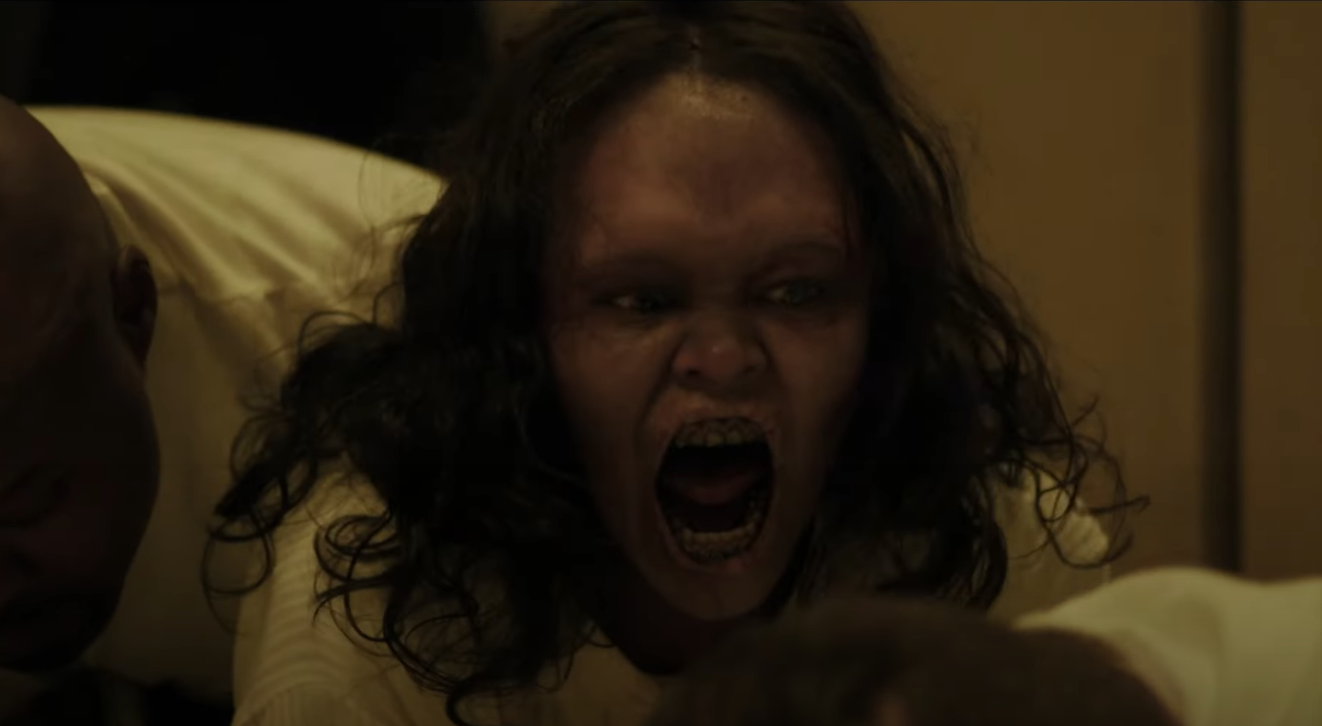
The latest iteration of The Exorcist comes from David Gordon Green, who has previously helmed a new Halloween trilogy. Similar to those films, The Exorcist: Believer has many of the same problems. It’s a film that poses unique questions and themes but never builds on them, hoping something comes together if everything is swirled together in a stew of horror nostalgia. It’s a recipe that doesn’t work.
See if you can spot where the film is going from this premise. Single father Victor Fielding (Leslie Odom Jr.) is haunted by memories of his wife (Tracey Graves), who died during childbirth amid a tough call of deciding who to save. Having suffered loss, he continues to raise his daughter Angela (Lidya Jewett) with love and affection, fighting off those somber thoughts as much as possible. But when Angela goes missing for days, he fears losing her. He grows even more fearful when she returns possessed by a demon.
That should be enough for a solid Exorcist film, but hold on! Another kid possessed is Katherine (Olivia Marcum), Angela’s school friend who shares the same affliction. So there’s a dual exorcism that’ll have to be performed. But wait, it gets even more complicated. Victor has lived without faith after being disillusioned by his wife’s death, while Katherine’s family is highly religious in their Christian faith. The faithful and the faithless have to come together to save the day, even though supernatural narratives like this always fall back on faith being the key ingredient. There’s also a questioning of which child to save as one might not make it.
And as if all that weren’t enough, we have legacy cameos thrown into the mix. Ellen Burstyn returns as Chris MacNeil, the mother of the possessed Regan from the first Exorcist movie. She’s not given much to do in this film besides relay her experience, deliver bland dialogue on the nature of evil, and show up to witness all the same events with a been-there expression. And that’s not even half the cast! There’s also a religious nurse/former nun (Ann Dowd), a ritualistic healer (Okwui Okpokwasili), a conflicted priest (E.J. Bonilla), a nosey Pentecostal preacher (Danny McCarthy), and a loud Baptist pastor (Raphael Sbarge) who all slam together into the third act for the big exorcism finale.
Earlier this year, there was another exorcism movie, The Pope’s Exorcism. It was a campy and dorky horror film that revealed a central flaw with exorcism movies that have decayed over time: it’s funny when children say nasty stuff and do creepy acts. Having Angela and Katherine cavort across the screen as rampaging demon-possessed kids is bound to bring out laughs. The few times they’re unleashed, it’s mildly amusing. The problem is that the film wants to downplay this as much as possible, as though relying on this form of fright is embarrassing.
While the fact of the franchise’s silly frights is valid, they are replaced with a messy and lackluster journey of faith that constantly contradicts itself. The film states that all rituals are different for exorcism, but only one works here. The themes suggest that family and unity will save the day and that an inexplicable prologue baptism is the real key to everything. There’s an extra sour taste to this film where it pitches that the only way to avoid a demon dragging your soul to hell is if you had a protection spell delivered before birth. Wrap it all up in a pithy observation on God’s love and why bad things happen in this world, and you have a horror movie that shrugs at everything it throws at the screen.
The Exorcist: Believer is a mess, never deciding what it wants to be about and toppling over itself with too many characters and themes that are rarely explored or all that interesting. Even on the base level of going into this film for the scares that the original touted itself on, there’s not much this film offers up. Aside from one scene involving a head spin from somebody who shouldn’t be twisting their neck, Believer has so little faith in being little more than a horror retread, tossing out ideas that never pay off and nostalgia that feels most artificial.

 “Deadpool & Wolverine” Review
“Deadpool & Wolverine” Review  “The Boys: Season Four” Review
“The Boys: Season Four” Review  “The American Society of Magical Negroes” Review
“The American Society of Magical Negroes” Review  “Twisters” Review
“Twisters” Review  “Sausage Party: Foodtopia” Review
“Sausage Party: Foodtopia” Review  “Robot Dreams” Review
“Robot Dreams” Review  “Godzilla x Kong: The New Empire” Review
“Godzilla x Kong: The New Empire” Review  “Slave Play. Not a Movie. A Play.” Review
“Slave Play. Not a Movie. A Play.” Review 


